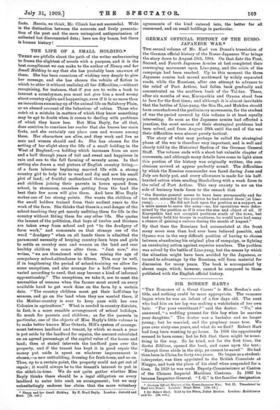GERMAN OFFICIAL HISTORY OF THE RUSSO. JAPANESE WAR.* THE second
volume of Mr. Karl von Donat's translation of the German official history of the Russo-Japanese War brings the story down to August 28th, 1904. On that date the First, Second, and Fourth Japanese Armies at last completed their converging movement upon Liao-yang, and the crisis of the campaign had been reached. Up to this moment the three Japanese armies had moved northward by widely separated roads, while the Russians, after one attempt to advance to the relief of Port Arthur, bad fallen back gradually and concentrated on the southern bank of the Tai-tzu. There, after six months of war, Kuropatkin and Oyama stood face to face for the first time; and although it is almost inevitable that the battles of Liao-yang., the Sha Ho, and Mukden should have overshadowed the preliminary movements, for the student of war the period covered by this volume is at least equally interesting. So soon as the Japanese armies bad effected a junction, the most serious of their strategical problems bad been solved, and from August 28th until the end of the war their difficulties were almost purely tactical.
The story of what may perhaps be called the strategical phase of the war is therefore very important, and is well and clearly told by the Historical Section of the German General Staff. The volume ends with a short but valuable chapter of comments, and although many details have come to light since this portion of the history was originally written, the con- clusions arrived at appear perfectly sound. The difficulties by which the Russian commander was faced during June and July are fairly put, and every allowance is made for his half- hearted action when sending Stackelberg with a weak force to the relief of Port Arthur. This very anxiety to err on the side of leniency lends force to the remark that " the Russian general seems to have been permanently and far too much attracted by the position he had created there [at Liao-
yang] He did not look upon the position as a support, as a mere means to serve the army—no, his operations were deter- mined by the position as if it were the aim and object of all. If Kuropatkin had not occupied positions south of the town, but had merely held his troops in readiness, he would have had many a chance of gaining a success during the month of August."
By that time the Russians had accumulated at the front many more men than had ever been believed possible, and Oyama was in the very difficult position of having to choose between abandoning his original plan of campaign, or fighting an enveloping action against superior numbers. The problem was solved by the battle of Liao-yang, but the means by which the situation might have been avoided by the Japanese, or turned to advantage by the Russians, will form material for discussion for many years. The book is accompanied by eleven maps, which, however, cannot be compared to those published with the English official history.






































 Previous page
Previous page